人教新目标(Go for it)版七下期末复习-知识点梳理U11-U12课件(共36张PPT)
文档属性
| 名称 | 人教新目标(Go for it)版七下期末复习-知识点梳理U11-U12课件(共36张PPT) |  | |
| 格式 | pptx | ||
| 文件大小 | 42.3MB | ||
| 资源类型 | 教案 | ||
| 版本资源 | 人教新目标(Go for it)版 | ||
| 科目 | 英语 | ||
| 更新时间 | 2024-06-09 21:58:40 | ||
图片预览


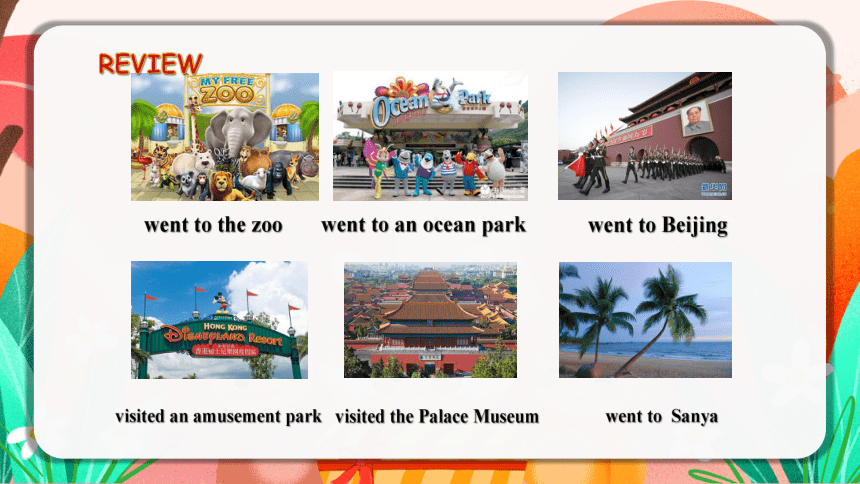
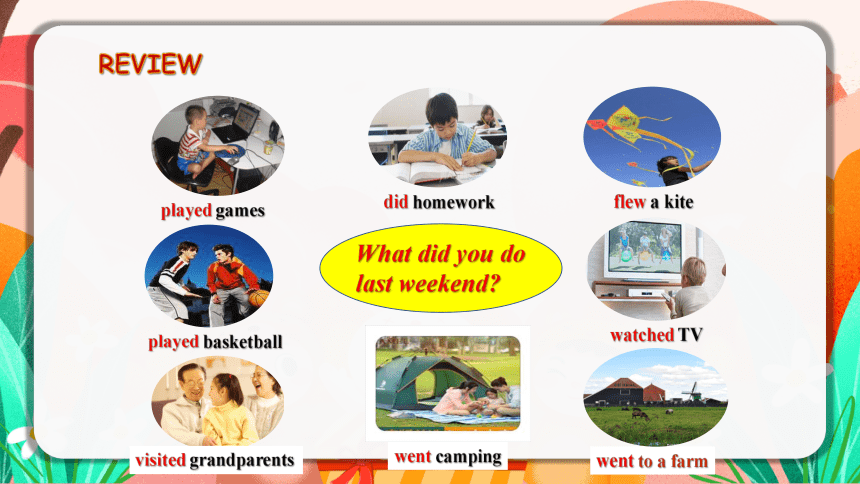
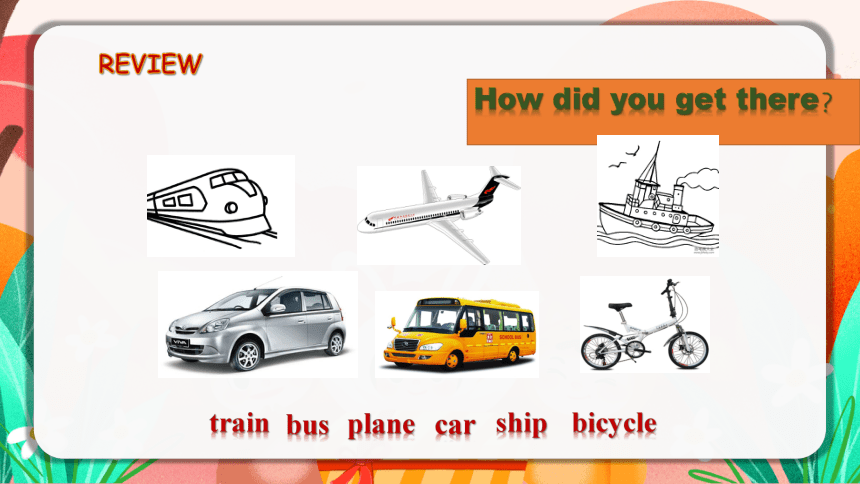
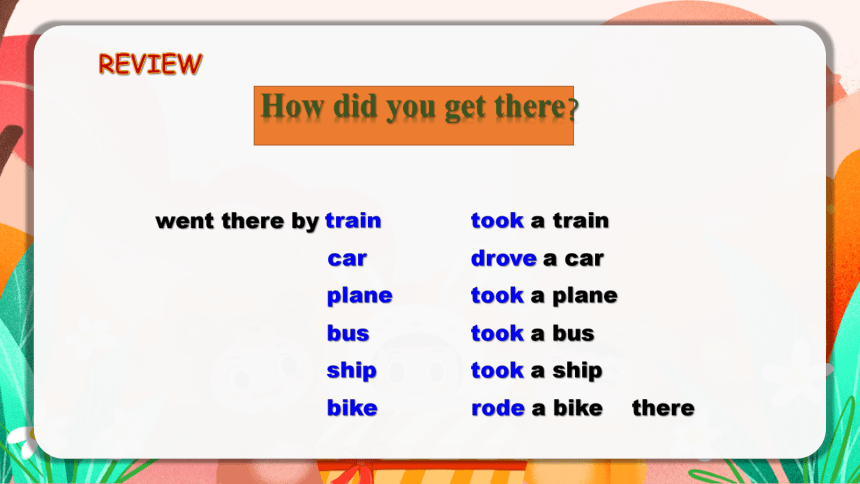
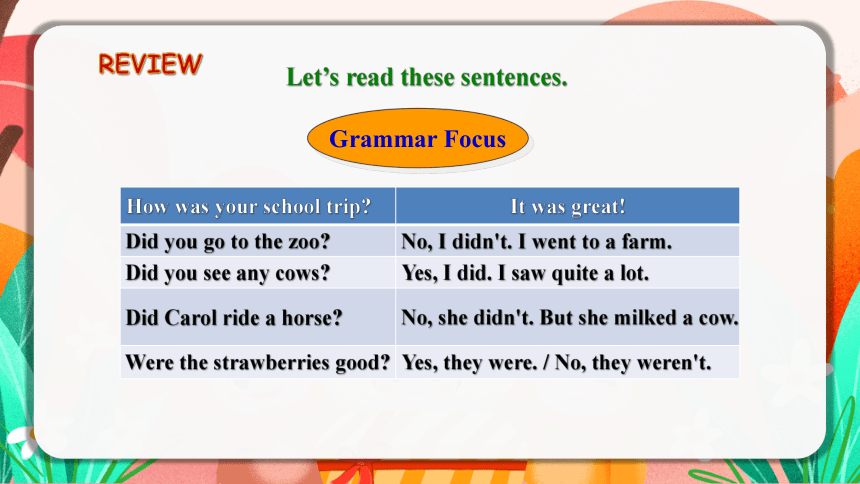
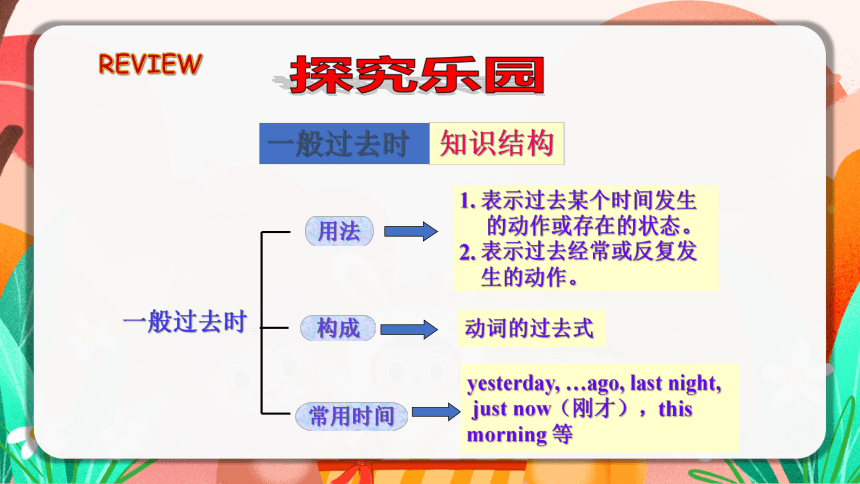
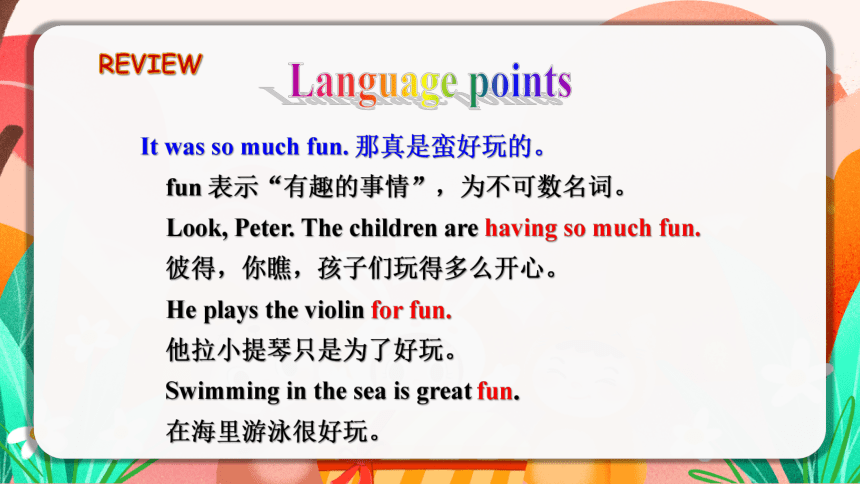
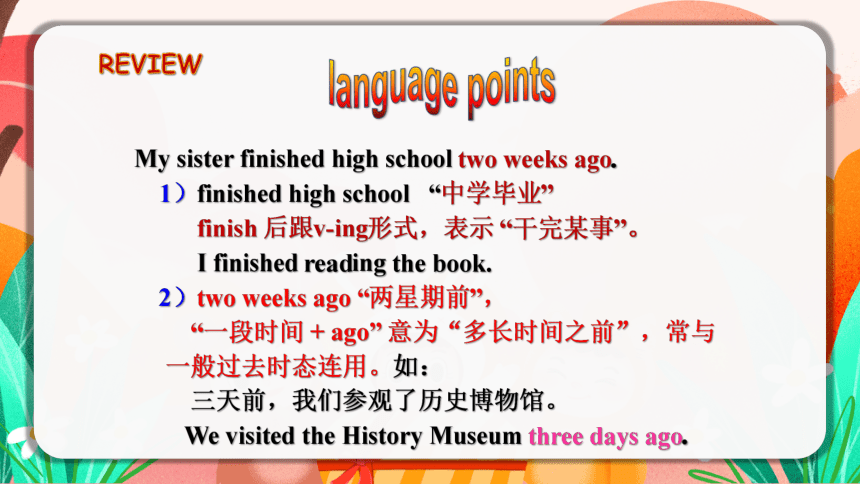
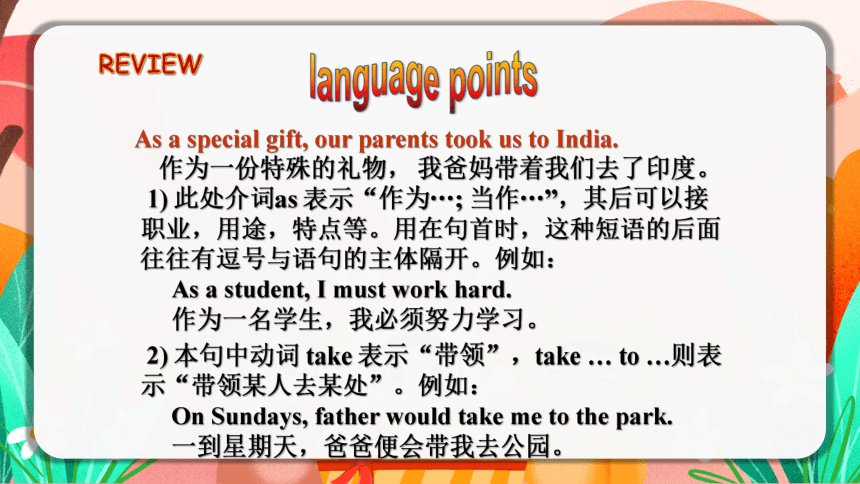
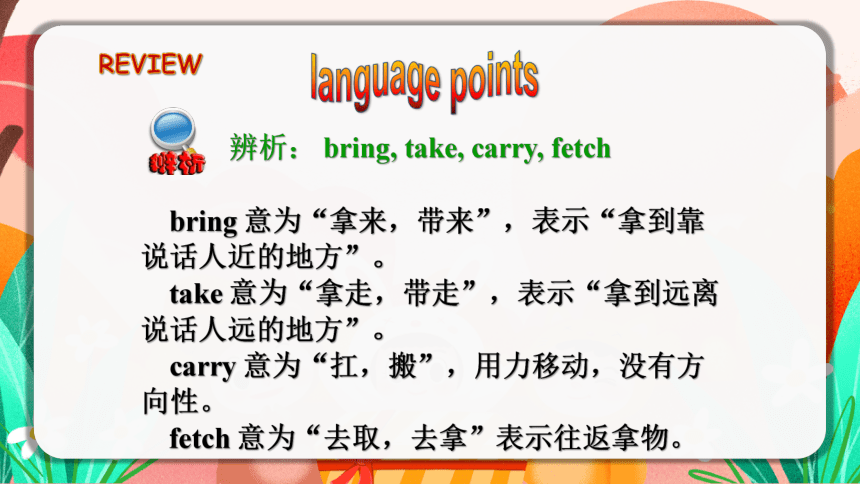
文档简介
(共36张PPT)
七下期末复习
知识点梳理
U11-U12
知识梳理
U11
went to the zoo
went to an ocean park
went to Beijing
visited an amusement park
visited the Palace Museum
went to Sanya
REVIEW
What did you do last weekend
did homework
played games
flew a kite
played basketball
watched TV
visited grandparents
went camping
went to a farm
REVIEW
How did you get there?
bicycle
train
bus
plane
car
ship
REVIEW
How did you get there?
went there by train
car
plane
bus
ship
bike
took a train
drove a car
took a plane
took a bus
took a ship
rode a bike there
REVIEW
How was your school trip It was great!
Did you go to the zoo No, I didn't. I went to a farm.
Did you see any cows Yes, I did. I saw quite a lot.
Did Carol ride a horse No, she didn't. But she milked a cow.
Were the strawberries good Yes, they were. / No, they weren't.
Grammar Focus
REVIEW
Let’s read these sentences.
知识结构
构成
用法
常用时间
动词的过去式
1. 表示过去某个时间发生
的动作或存在的状态。
2. 表示过去经常或反复发
生的动作。
yesterday, …ago, last night,
just now(刚才),this
morning 等
一般过去时
一般过去时
探究乐园
REVIEW
It was so much fun. 那真是蛮好玩的。
fun 表示“有趣的事情”,为不可数名词。
Look, Peter. The children are having so much fun.
彼得,你瞧,孩子们玩得多么开心。
He plays the violin for fun.
他拉小提琴只是为了好玩。
Swimming in the sea is great fun.
在海里游泳很好玩。
Language points
REVIEW
My sister finished high school two weeks ago.
1)finished high school “中学毕业”
finish 后跟v-ing形式,表示 “干完某事”。
I finished reading the book.
2)two weeks ago “两星期前”,
“一段时间 + ago” 意为“多长时间之前”,常与
一般过去时态连用。如:
三天前,我们参观了历史博物馆。
We visited the History Museum three days ago.
language points
REVIEW
As a special gift, our parents took us to India.
作为一份特殊的礼物, 我爸妈带着我们去了印度。
1) 此处介词as 表示“作为…; 当作…”,其后可以接
职业,用途,特点等。用在句首时,这种短语的后面
往往有逗号与语句的主体隔开。例如:
As a student, I must work hard.
作为一名学生,我必须努力学习。
2) 本句中动词 take 表示“带领”,take … to …则表
示“带领某人去某处”。例如:
On Sundays, father would take me to the park.
一到星期天,爸爸便会带我去公园。
language points
REVIEW
辨析: bring, take, carry, fetch
bring 意为“拿来,带来”,表示“拿到靠说话人近的地方”。
take 意为“拿走,带走”,表示“拿到远离说话人远的地方”。
carry 意为“扛,搬”,用力移动,没有方向性。
fetch 意为“去取,去拿”表示往返拿物。
language points
REVIEW
took a long bus ride to “乘坐长途公交车去...”
ride 此处作可数名词,意为“(乘车的)旅行, 旅程”。 take a ride 兜风
ride 还可作动词,意为“骑(马等);乘(车)等”。
例句:你妹妹会骑自行车吗?
Can your sister ride a bike
we took a long bus ride to a lake in the countryside.
language points
REVIEW
There we put up our tents and made a fire to keep us warm and cook food on.在那里我们架起帐篷,生活取暖并做饭。
(1)put up动词短语,此处意为“搭起”,另外还有
“举起;张贴;建造”之意。e.g. :
Can you help me put up some ads
你能帮我贴广告吗?
put的过去式是put。像这样动词过去式与原形相
同的词还有:cut―cut; read―read; let―let等。
(2)made a fire 生火
language points
REVIEW
(3) keep us warm 保持我们暖和,
keep +宾语+形容词/ doing sth. 意为“使某人/某物一
直处于某种状态或做某事”,e.g.:
Please keep the classroom clean. 请保持教室干净。
Don’t keep him waiting. 别让他等。
(4) 本句的主体部分是we put up tents and made a fire,
后续的 to keep us warm and cook food on (it) 表达的
是made a fire 的目的。句尾介词“on” 后有所省略,
以避免重复。
language points
REVIEW
Sounds good. 听起来不错!
此句子省略了主语 it, 完整应该是 it sounds good.
此处sound为系动词,表示“听起来…”其后加形容词。
同样用法的单词还有feel, taste,smell, look 等等,表
示“摸,尝,闻,看……起来”。
This coat feels soft. 这件上衣摸起来很软。
The supper smells delicious. 晚饭闻起来很香
Language points
REVIEW
Lucky you! 你真幸运!
相当于You’re so lucky. lucky 之后的人称还可改为
me, him 等。
A: There was no power at school last night. It was so dark. 昨天晚上学校停电了,漆黑一片。
B: Lucky me. I was not here. 我多幸运呀,不在那里。
lucky的名词luck,副词 luckily,反义词 unlucky 。
Language points
REVIEW
知识梳理
U12
What did she/he do yesterday
watched TV
played badminton
did homework
took some photos
rode a horse
drew a picture
Ask and answer
REVIEW
What did she/he/they do last weekend
She did her homework.
They went to the cinema.
He played badminton.
They went to the beach.
Ask and answer
REVIEW
Did you do anything interesting last weekend
(1)该句是一般过去式的疑问句,其结构是:
Did+主语+动词原形+其它? 如:
Did you do your homework yesterday morning
你昨天早上做家庭作业了吗?
含be动词的一般疑问句的结构是:
Be(was/were)+主语+其它?如:
Was he our English teacher last year
他是我们去年的英语的老师吗?
Language points
REVIEW
(2)anything是不定代词.
含-thing复合不定代词通常指物,something (某物)通常用于肯定句中; 而anything意为“任何事,任何(东西)”,一般用于否定句,疑问句或条件状语从句中; nothing(没有东西 )在意义上等于 not anything。
如 : There isn't anything in the box.
这个盒子里什么都没有。
Is there anything in the box
盒子里有什么东西没?
Language points
REVIEW
(3)anything interesting “有趣的事情”
形容词修饰 something , somebody,anything , anybody,nothing等不定代词时,要放在这些不定代词的后面,作后置定语。如:
Language points
① Can you tell something interesting
你能讲些有趣的事情吗
② Is there anybody important here
这儿有大人物吗
REVIEW
1) quiet a lot “相当多”,可以单独使用;也可
以在后面+ of +可数或不可数 。
quite a little “相当多” +不可数名词
quite a few “相当多” +可数名词
Did you see any cows
Yes, I did. I saw quite a lot.
Language points
REVIEW
e.g.
我们喝了不少酒。
We drank quite a lot of wine.
我看到了相当多的奶牛。
I saw quite a lot of cows.
夏天我经常打网球。
I play tennis quite a lot in the summer.
不少学生迟到了。
Quite a few students were late.
Language points
REVIEW
2) quite adv. “相当;完全;十分;很”,它不但能修
饰动词、形容词、副词,还能修饰名词。
① quite修饰形容词、副词等。例如:
She is quite right.她完全正确。
She sings quite well. 她唱得非常好。
② quite修饰名词。
1. 当名词前没有形容词修饰时,quite要放在冠词前。quite a lot(许多),quite a few(相当多),quite a little(相当多;大量的)
2. 当名词前有形容词修饰时,quite可放在冠词前,也可放在冠词之后,但放在冠词之前较普遍。
He is quite a clever boy= He is a quite clever boy.
Language points
REVIEW
take与photo, picture等词搭配时,表示“拍摄,摄影”。表示“拍摄某物或人”,就要在短语后面接介词“of”引入所拍摄的对象。e.g.
The girl likes to take photos of herself with her cell phone.
Did Carol take any photos
卡罗尔拍照片了吗?
Language points
REVIEW
fed chickens 喂鸡
feed vt. “ 喂养”, 后面可以直接跟宾语。Eg:
We fed the birds yesterday. 我们昨天喂鸟了。
常用结构:
(1) feed sth. to sb. 意为“把…喂给…吃”。
Please feed some grass to the cow. 请给牛喂点草。
(2) feed sb. on/with sth. 意为“用……喂……”。
Please feed the cow on/with some grass.
I feed my cat with / on fish. = I feed fish to my cat.
我用鱼喂猫。
Language points
REVIEW
模拟练习
1. Lucy did her homework at home.(改否定句)
Lucy ______ ___ her homework at home.
2. He found some meat in the fridge.(变一般疑问句)
____ he ____ ____ meat in the fridge
3. She stayed at home over the weekend.(划线部分提问)
______ ____ she ____ over the weekend
4. There was some orange juice in the cup.(一般疑问句)
_____ there ____ orange juice in the cup
didn’t
do
Did
find
any
stay
Was
any
Where
did
改写句子:
1. - ___ had dinner with friends - My brother ___.
A. What; did B. Who; did
C. Who; does D. Where; does
2. - ____ did you go last Saturday
- I went to the Great Wall.
A. What B. How C. When D. Where
3. ____ he ____ volleyball last Friday
A. Does; play B. Did; played
C. Is; playing D. Did; play
B
A
D
Exercise
Tim: Joy, _____was your weekend
Joy: Excellent! I had a good time.
Tim: ______ ____ you ___
Joy: I _____ to Hainan Island.
Tim: _____ was the weather?
Joy: It was not hot____ cold. There ____ long beaches.
Tim: What _____ you do
Joy: I _____ swimming. I really enjoyed it.
Tim : I want __ go to Hainan Island, too. I can’t wait.
how
Where did go
went
How
or
did
went
to
补全对话, 每空一词。
are
Exercise
1. She often ____ (go) to the park on weekends, but yesterday she ____ (go) to the zoo.
2. Last week she ___ (have) fun on a farm.
3. What ___ they __ (do) on the school trip
They ____ (ride) horses and _______ (climb) the mountains.
4. How ____ their school trip It ___ interesting.
5. ___ she __ (go) fishing Yes, she did.
6. ___ Li Ming ____ (pick) any strawberries
No, he didn’t.
填入适当的词。
goes
went
had
did do
rode climbed
was
was
Did go
Did pick
Exercise
1. They had lunch at home this morning. (提问)
_____ ____ they ___ at home this morning
2. My school trip was great. (提问)
_____ was _____ school trip
3. Jack watched a basketball game last night. (提问)
_____ ____ Jack ____ last night
4. He saw something in the tree. (改为否定句)
He in the tree.
5. They had a good time at the party. (改为同义句)
They _______ ___________ at the party.
What did do
How your
What did do
didn’t see anything
enjoyed themselves
根据要求完成句子
翻译下列句子。
1. 我们在那儿爬山, 看到了很多花。
2. 我们在树下吃了午餐,之后又玩游戏。
3. 太阳半小时前又出来了。
4. 昨天我们担心天会下雨。
5. 几分钟前,天变阴了。
We climbed the mountains there and saw a lot of flowers.
We ate our lunch under trees and played games after that.
The sun came out again half an hour.
Yesterday we worried it would rain.
A few minutes ago, it got cloudy.
Exercise
thanks
七下期末复习
知识点梳理
U11-U12
知识梳理
U11
went to the zoo
went to an ocean park
went to Beijing
visited an amusement park
visited the Palace Museum
went to Sanya
REVIEW
What did you do last weekend
did homework
played games
flew a kite
played basketball
watched TV
visited grandparents
went camping
went to a farm
REVIEW
How did you get there?
bicycle
train
bus
plane
car
ship
REVIEW
How did you get there?
went there by train
car
plane
bus
ship
bike
took a train
drove a car
took a plane
took a bus
took a ship
rode a bike there
REVIEW
How was your school trip It was great!
Did you go to the zoo No, I didn't. I went to a farm.
Did you see any cows Yes, I did. I saw quite a lot.
Did Carol ride a horse No, she didn't. But she milked a cow.
Were the strawberries good Yes, they were. / No, they weren't.
Grammar Focus
REVIEW
Let’s read these sentences.
知识结构
构成
用法
常用时间
动词的过去式
1. 表示过去某个时间发生
的动作或存在的状态。
2. 表示过去经常或反复发
生的动作。
yesterday, …ago, last night,
just now(刚才),this
morning 等
一般过去时
一般过去时
探究乐园
REVIEW
It was so much fun. 那真是蛮好玩的。
fun 表示“有趣的事情”,为不可数名词。
Look, Peter. The children are having so much fun.
彼得,你瞧,孩子们玩得多么开心。
He plays the violin for fun.
他拉小提琴只是为了好玩。
Swimming in the sea is great fun.
在海里游泳很好玩。
Language points
REVIEW
My sister finished high school two weeks ago.
1)finished high school “中学毕业”
finish 后跟v-ing形式,表示 “干完某事”。
I finished reading the book.
2)two weeks ago “两星期前”,
“一段时间 + ago” 意为“多长时间之前”,常与
一般过去时态连用。如:
三天前,我们参观了历史博物馆。
We visited the History Museum three days ago.
language points
REVIEW
As a special gift, our parents took us to India.
作为一份特殊的礼物, 我爸妈带着我们去了印度。
1) 此处介词as 表示“作为…; 当作…”,其后可以接
职业,用途,特点等。用在句首时,这种短语的后面
往往有逗号与语句的主体隔开。例如:
As a student, I must work hard.
作为一名学生,我必须努力学习。
2) 本句中动词 take 表示“带领”,take … to …则表
示“带领某人去某处”。例如:
On Sundays, father would take me to the park.
一到星期天,爸爸便会带我去公园。
language points
REVIEW
辨析: bring, take, carry, fetch
bring 意为“拿来,带来”,表示“拿到靠说话人近的地方”。
take 意为“拿走,带走”,表示“拿到远离说话人远的地方”。
carry 意为“扛,搬”,用力移动,没有方向性。
fetch 意为“去取,去拿”表示往返拿物。
language points
REVIEW
took a long bus ride to “乘坐长途公交车去...”
ride 此处作可数名词,意为“(乘车的)旅行, 旅程”。 take a ride 兜风
ride 还可作动词,意为“骑(马等);乘(车)等”。
例句:你妹妹会骑自行车吗?
Can your sister ride a bike
we took a long bus ride to a lake in the countryside.
language points
REVIEW
There we put up our tents and made a fire to keep us warm and cook food on.在那里我们架起帐篷,生活取暖并做饭。
(1)put up动词短语,此处意为“搭起”,另外还有
“举起;张贴;建造”之意。e.g. :
Can you help me put up some ads
你能帮我贴广告吗?
put的过去式是put。像这样动词过去式与原形相
同的词还有:cut―cut; read―read; let―let等。
(2)made a fire 生火
language points
REVIEW
(3) keep us warm 保持我们暖和,
keep +宾语+形容词/ doing sth. 意为“使某人/某物一
直处于某种状态或做某事”,e.g.:
Please keep the classroom clean. 请保持教室干净。
Don’t keep him waiting. 别让他等。
(4) 本句的主体部分是we put up tents and made a fire,
后续的 to keep us warm and cook food on (it) 表达的
是made a fire 的目的。句尾介词“on” 后有所省略,
以避免重复。
language points
REVIEW
Sounds good. 听起来不错!
此句子省略了主语 it, 完整应该是 it sounds good.
此处sound为系动词,表示“听起来…”其后加形容词。
同样用法的单词还有feel, taste,smell, look 等等,表
示“摸,尝,闻,看……起来”。
This coat feels soft. 这件上衣摸起来很软。
The supper smells delicious. 晚饭闻起来很香
Language points
REVIEW
Lucky you! 你真幸运!
相当于You’re so lucky. lucky 之后的人称还可改为
me, him 等。
A: There was no power at school last night. It was so dark. 昨天晚上学校停电了,漆黑一片。
B: Lucky me. I was not here. 我多幸运呀,不在那里。
lucky的名词luck,副词 luckily,反义词 unlucky 。
Language points
REVIEW
知识梳理
U12
What did she/he do yesterday
watched TV
played badminton
did homework
took some photos
rode a horse
drew a picture
Ask and answer
REVIEW
What did she/he/they do last weekend
She did her homework.
They went to the cinema.
He played badminton.
They went to the beach.
Ask and answer
REVIEW
Did you do anything interesting last weekend
(1)该句是一般过去式的疑问句,其结构是:
Did+主语+动词原形+其它? 如:
Did you do your homework yesterday morning
你昨天早上做家庭作业了吗?
含be动词的一般疑问句的结构是:
Be(was/were)+主语+其它?如:
Was he our English teacher last year
他是我们去年的英语的老师吗?
Language points
REVIEW
(2)anything是不定代词.
含-thing复合不定代词通常指物,something (某物)通常用于肯定句中; 而anything意为“任何事,任何(东西)”,一般用于否定句,疑问句或条件状语从句中; nothing(没有东西 )在意义上等于 not anything。
如 : There isn't anything in the box.
这个盒子里什么都没有。
Is there anything in the box
盒子里有什么东西没?
Language points
REVIEW
(3)anything interesting “有趣的事情”
形容词修饰 something , somebody,anything , anybody,nothing等不定代词时,要放在这些不定代词的后面,作后置定语。如:
Language points
① Can you tell something interesting
你能讲些有趣的事情吗
② Is there anybody important here
这儿有大人物吗
REVIEW
1) quiet a lot “相当多”,可以单独使用;也可
以在后面+ of +可数或不可数 。
quite a little “相当多” +不可数名词
quite a few “相当多” +可数名词
Did you see any cows
Yes, I did. I saw quite a lot.
Language points
REVIEW
e.g.
我们喝了不少酒。
We drank quite a lot of wine.
我看到了相当多的奶牛。
I saw quite a lot of cows.
夏天我经常打网球。
I play tennis quite a lot in the summer.
不少学生迟到了。
Quite a few students were late.
Language points
REVIEW
2) quite adv. “相当;完全;十分;很”,它不但能修
饰动词、形容词、副词,还能修饰名词。
① quite修饰形容词、副词等。例如:
She is quite right.她完全正确。
She sings quite well. 她唱得非常好。
② quite修饰名词。
1. 当名词前没有形容词修饰时,quite要放在冠词前。quite a lot(许多),quite a few(相当多),quite a little(相当多;大量的)
2. 当名词前有形容词修饰时,quite可放在冠词前,也可放在冠词之后,但放在冠词之前较普遍。
He is quite a clever boy= He is a quite clever boy.
Language points
REVIEW
take与photo, picture等词搭配时,表示“拍摄,摄影”。表示“拍摄某物或人”,就要在短语后面接介词“of”引入所拍摄的对象。e.g.
The girl likes to take photos of herself with her cell phone.
Did Carol take any photos
卡罗尔拍照片了吗?
Language points
REVIEW
fed chickens 喂鸡
feed vt. “ 喂养”, 后面可以直接跟宾语。Eg:
We fed the birds yesterday. 我们昨天喂鸟了。
常用结构:
(1) feed sth. to sb. 意为“把…喂给…吃”。
Please feed some grass to the cow. 请给牛喂点草。
(2) feed sb. on/with sth. 意为“用……喂……”。
Please feed the cow on/with some grass.
I feed my cat with / on fish. = I feed fish to my cat.
我用鱼喂猫。
Language points
REVIEW
模拟练习
1. Lucy did her homework at home.(改否定句)
Lucy ______ ___ her homework at home.
2. He found some meat in the fridge.(变一般疑问句)
____ he ____ ____ meat in the fridge
3. She stayed at home over the weekend.(划线部分提问)
______ ____ she ____ over the weekend
4. There was some orange juice in the cup.(一般疑问句)
_____ there ____ orange juice in the cup
didn’t
do
Did
find
any
stay
Was
any
Where
did
改写句子:
1. - ___ had dinner with friends - My brother ___.
A. What; did B. Who; did
C. Who; does D. Where; does
2. - ____ did you go last Saturday
- I went to the Great Wall.
A. What B. How C. When D. Where
3. ____ he ____ volleyball last Friday
A. Does; play B. Did; played
C. Is; playing D. Did; play
B
A
D
Exercise
Tim: Joy, _____was your weekend
Joy: Excellent! I had a good time.
Tim: ______ ____ you ___
Joy: I _____ to Hainan Island.
Tim: _____ was the weather?
Joy: It was not hot____ cold. There ____ long beaches.
Tim: What _____ you do
Joy: I _____ swimming. I really enjoyed it.
Tim : I want __ go to Hainan Island, too. I can’t wait.
how
Where did go
went
How
or
did
went
to
补全对话, 每空一词。
are
Exercise
1. She often ____ (go) to the park on weekends, but yesterday she ____ (go) to the zoo.
2. Last week she ___ (have) fun on a farm.
3. What ___ they __ (do) on the school trip
They ____ (ride) horses and _______ (climb) the mountains.
4. How ____ their school trip It ___ interesting.
5. ___ she __ (go) fishing Yes, she did.
6. ___ Li Ming ____ (pick) any strawberries
No, he didn’t.
填入适当的词。
goes
went
had
did do
rode climbed
was
was
Did go
Did pick
Exercise
1. They had lunch at home this morning. (提问)
_____ ____ they ___ at home this morning
2. My school trip was great. (提问)
_____ was _____ school trip
3. Jack watched a basketball game last night. (提问)
_____ ____ Jack ____ last night
4. He saw something in the tree. (改为否定句)
He in the tree.
5. They had a good time at the party. (改为同义句)
They _______ ___________ at the party.
What did do
How your
What did do
didn’t see anything
enjoyed themselves
根据要求完成句子
翻译下列句子。
1. 我们在那儿爬山, 看到了很多花。
2. 我们在树下吃了午餐,之后又玩游戏。
3. 太阳半小时前又出来了。
4. 昨天我们担心天会下雨。
5. 几分钟前,天变阴了。
We climbed the mountains there and saw a lot of flowers.
We ate our lunch under trees and played games after that.
The sun came out again half an hour.
Yesterday we worried it would rain.
A few minutes ago, it got cloudy.
Exercise
thanks
同课章节目录
- Unit 1 Can you play the guitar?
- Section A
- Section B
- Unit 2 What time do you go to school?
- Section A
- Section B
- Unit 3 How do you get to school?
- Section A
- Section B
- Unit 4 Don't eat in class.
- Section A
- Section B
- Unit 5 Why do you like pandas?
- Section A
- Section B
- Unit 6 I'm watching TV.
- Section A
- Section B
- Review of Units 1-6
- Unit 7 It's raining!
- Section A
- Section B
- Unit 8 Is there a post office near here?
- Section A
- Section B
- Unit 9 What does he look like?
- Section A
- Section B
- Unit 10 I'd like some noodles.
- Section A
- Section B
- Unit 11 How was your school trip?
- Section A
- Section B
- Unit 12 What did you do last weekend?
- Section A
- Section B
